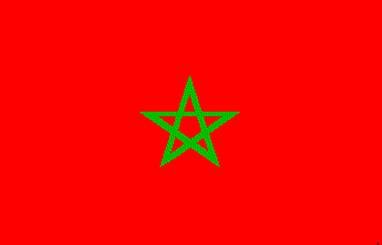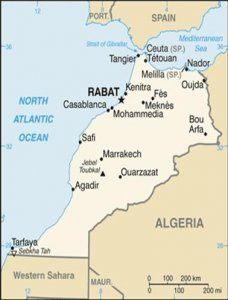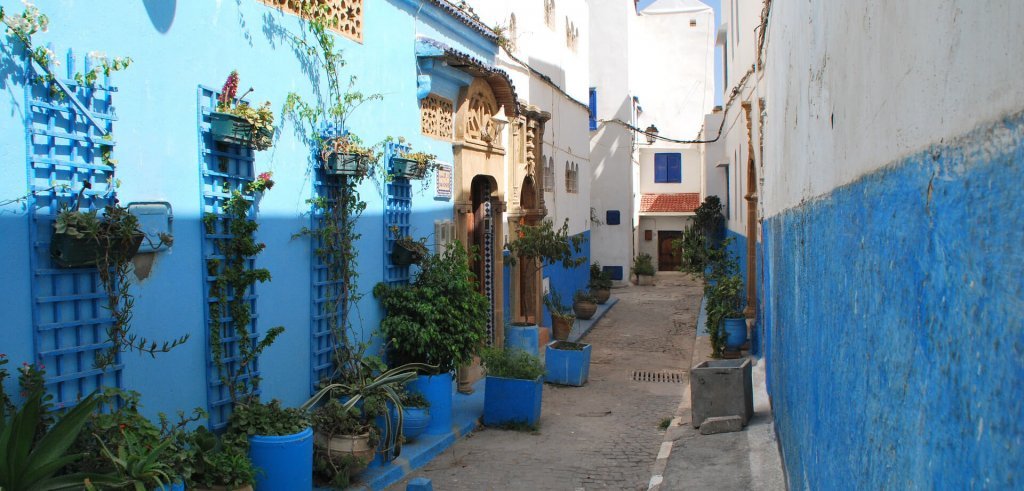
GEOGRAPHY
Morocco is located on the westernmost tip of North Africa, bordering Algeria to the east, Mauritania and the disputed territory of Western Sahara to the southwest and southeast, the Atlantic Ocean to the west and the Mediterranean to the north. Running through the middle of the country is the Atlas mountain range. The Middle Atlas range sweeps up from the south, rising to over 9,850ft, covered with woodlands of pine, oak and cedar, open pastureland and small lakes. The Rif Mountains run along the north coast. Often snow-covered in winter, Morocco’s mountains are home to the country’s significant indigenous Berber population. The long stretch of Atlantic coast down Morocco’s western side features cool breezes and long sandy beaches.
It is separated from the mountainous region by wide swathes of fertile plains. To the north, is the Mediterranean coast, just a stone’s throw from Europe. In the south of the country, the Sahara is the largest desert in the world. Far from being featureless, it is dotted with fascinating traditional villages and cool oases.
HISTORY
Since King Mohammed VI was enthroned in 1999, the country has instituted sweeping political and economic changes. Although poverty is still widespread and unemployment remains high, initiatives to attract foreign investment and tourism are bringing new opportunities to urban areas. The human rights record is markedly improved from the previous regime, and today ranks among the cleanest across Africa and the Middle East. Women have benefitted from education initiatives and expanded rights, and new protections for Berber (Amazigh) culture include the introduction of Tamazight (written Berber) in schools.

Morocco’s parliament has only nominal power, but the country’s first municipal elections in 2002 were hailed as a step towards democratization. Islamist and other political factions are closely monitored, as is the news media. Two territorial disputes remain: the Western Sahara, claimed by the indigenous Sahrawi Polisario Front, and the Spanish-occupied enclaves of Ceuta and Melilla, on Morocco’s Mediterranean coast.
THE PEOPLE
Predominantly Muslim with Jewish, Christian and Hindu minorities. Morocco’s population and culture is a blend of religious and cultural traditions, encompassing Berber, Arab, African, Mediterranean and Jewish influences.
SOCIAL CONVENTIONS
Handshaking is the customary form of greeting. Many of the manners and social customs emulate French manners, particularly amongst the middle class. The visitor may find, in some social situations, that patience and firmness will pay dividends. Often visitors may find themselves the center of unsolicited attention. In towns, young boys after money will be eager to point out the way, sell goods or simply charge for a photograph, while unofficial guides will always be offering advice or services. The visitor should be courteous but wary of the latter. Normal social courtesies should be observed in someone’s home. Casual wear is widely acceptable, although swimsuits and shorts should be confined to the beach or poolside.
LANGUAGES
The official language is Arabic, but a large minority speaks Berber.
French is widely spoken throughout the country, except in the northern regions where Spanish is more predominant. English is also understood, particularly in the north and the main tourist areas.
GOVERNMENT
Constitutional monarchy since 1956, when Morocco gained independence from France.
TIME ZONE
GMT +1 in the summer months and GMT in the winter months.
ELECTRICITY
127/220 volts AC, 50Hz, depending on age and location of building.
Below you will find the type of outlets used in Morocco along with their corresponding plugs (Type C Plug and Type E Plug). Please use the proper adapters found below for any electrics you may be using.
| Type C Plug (127V) | Type C Outlet (127V) |
 |
 |
| Type E Plug (220V) | Type E Outlet (220V) |
 |
 |
| Adapter for Type C & Type E (Front) | Adapter for Type C & Type E (Back) |
 |
 |
CLIMATE
Although it is famous for its warm weather, Morocco offers a temperate climate most of the year. On the coast, the sea breeze prevents great summer heat. In winter the average temperature never goes below 50˚F and there is hardly ever any frost. Inland, the climate is continental, hotter in the summer and colder in the winter – the range being wider between diurnal and nocturnal temperatures. Rainfall is irregular and diminishes progressively from the north to the south and from the west to the east. Snow falls in winter in altitudes over 5,000 ft and lasts six to nine months in heights over 6,600 ft.
Clothes to Wear:
Lightweight cottons and linens are worn during summer, with warm medium weight wear for the evenings, during the winter, and in the mountains. Waterproofing is advisable in the wet season, particularly on the coast and in the mountains.
Morocco is a conservative nation with 99% of its population identifying as Muslims. Therefore, the first rule to dressing in Morocco is to respect Islam’s emphasis on modesty. Clothes and accessories are not meant to attract attention or excessively reveal the body. Women should ensure that their clothes do not expose the décolletage, shoulders, or thighs. This same principal applies to menswear.
Furthermore, because of Islam’s emphasis on modesty, brand names are not often seen on Moroccan streets. Most households tend to live prudently, and value giving to the community over materialism. So unless you want to attract attention, it’s best to limit the display of ostentatious jewelry, luxury handbags, and high-end electronics.
A woman traveling to Morocco should wear long skirts and dresses, jeans or pants that cover the knees, draping tunics, polo shirts, and camisoles that can be worn under sweaters and cardigans. Women generally wear sandals or loafers; rarely do they wear heels.
In general, men should wear long pants with a shirt, ideally a collared one. Men can wear sandals, loafers, or sneakers – whatever is appropriate for the context of the visit. While some boys and young men wear shorts in public, it is less common, particularly among adult men.
Morocco is sweltering in the summer months; however, it’s still necessary to cover the shoulders and legs. For women, a loose maxi dress with a light sweater or scarf over the shoulders is a brilliant way to stay cool and blend in with women who wear jabadors and kaftans.
LOGISTICAL
Entry & Exit Requirements:
Travelers to Morocco must have a valid passport. Visas are not required for American tourists traveling to Morocco for fewer than 90 days. For visits of more than 90 days, Americans are required to apply for an extension of stay (providing a reason for the extension). U.S. citizens are encouraged to carry a copy of their U.S. passports with them at all times, so that, if questioned by local officials, proof of identity and U.S. citizenship is readily available.
For further information on entry/exit requirements for Morocco, please contact the Embassy of Morocco at 1601 21st Street NW, Washington, DC 20009. Tel: (202) 462-7979 begin_of_the_skype_highlighting to 82, Fax: 202-462-7643. The Moroccan Consulate General in New York at 10 E. 40th Street, New York, NY 10016. Tel: (212) 758-2625 begin_of_the_skype_highlightingend_of_the_skype_highlighting, Fax: 212-779-7441. Visit the Embassy of Morocco web site for the most current visa information.
Americans living or traveling in Morocco are encouraged to register with the nearest U.S. embassy or consulate through the State Department’s travel registration web site so that they can obtain updated information on travel and security within Morocco. Americans without Internet access may register directly with the nearest U.S. embassy or consulate. By registering, American citizens make it easier for the embassy or consulate to contact them in case of emergency.
Embassy Locations:
U.S. Embassy in Morocco
Km 5.7, Avenue Mohamed VI
Souissi, Rabat 10170, Morocco
Phone: 011.212.537.637.200
Fax: 011.212.537.637.201
After hours: 011.212.661.131.939
Embassy of Canada to Morocco
66, Mehdi Ben Barka Avenue
Rabat-Souissi, Morocco Phone: 011.212.537.549.949 Fax: 011.212.537.544.853
Health:
No vaccinations are required to enter Morocco.
Information on vaccinations and other health precautions, such as safe food and water precautions and insect bite protection, may be obtained from the Centers for Disease Control and Prevention’s (CDC) hotline for international travelers at 1-800-CDC-INFO (1-800-232-4636) or via the CDC website at http://wwwnc.cdc.gov/travel. For information about outbreaks of infectious diseases abroad, consult the infectious diseases section of the World Health Organization (WHO) website at http://www.who.int/topics/infectious_ diseases/en/. The WHO website also contains additional health information for travelers, including detailed country-specific health information.
Banks & Currency:
Moroccan Dirham (MAD; symbol Dh) = 100 centimes. Notes are in denominations of Dh200, 100, 50, 20 and 10. Coins are in denominations of Dh10, 5 and 1, and 50, 20, 10 and 5 centimes.
Moroccan Dirhams can only be obtained in Morocco. The most convenient way to obtain Dirhams is through an ATM, where official rates automatically apply, but daily withdrawal limits can seem low for customers paying cash for rugs in the souks. National currencies should be exchanged at official bureau de change only (identified by a golden sign); changing money in the street is illegal. There is no commission charge and visitors will be issued with a receipt which they must keep in order to exchange Moroccan currency back into the original national currency upon departure. The US Dollar is widely accepted, even preferred.
Some credit cards are accepted in larger restaurants, hotels, guest houses and the occasional shop in the souks. Cash can be withdrawn from ATM’s in larger towns.
The import and export of local currency is prohibited; all local currency must be reconverted prior to departure. The import and export of foreign currency is limited to amounts equivalent to £10,000 and must be declared on arrival and departure.
Banking Hours: Mon-Thurs 08:30 am-12:30 pm and 3pm-06:30 pm, Fri 08:30 am-12pm and 3pm-06:30 pm.
Communication:
IDD is available. Country code: 212. Outgoing international code: 00. Fax facilities are available in hotels.
Cell Phone Usage:
Please contact your cell phone provider to determine whether your contract includes coverage in the country you are visiting. Depending on your contract you may have to add international services and/or country specific services.
ENTERTAINMENT
Food & Drink:
Morocco’s traditional haute cuisine dishes are excellent and good value for money. They are often exceedingly elaborate, based on a diet of meat and sweet pastries. Typical specialties include: harira, a rich soup, and pastilla, a pigeon-meat pastry made from dozens of different layers of thick flaky dough. Couscous, a dish based on savory semolina that can be combined with egg, chicken, lamb or vegetables, is a staple Moroccan dish. Tajine are stews, often rich and fragrant, using marinated lamb or chicken. Hout is a fish version of the same stew, while djaja mahamara is chicken stuffed with almonds, semolina and raisins. Also popular are mchoui, pit-roasted mutton, and kab-el-ghzal, almond pastries. Hotel restaurants usually serve French cuisine. Restaurants offer a good selection of food, including typical Moroccan dishes, French, Italian or Spanish meals. The 3-course fixed menus are not expensive. Many of the souks have stalls selling kebabs (brochettes) often served with a spicy sauce. Most restaurants have waiter service.
The national drink is mint tea made with green tea, fresh mint and sugar. It is very refreshing and its consumption is an integral part of Moroccan social courtesy. Coffee is made very strong, except at breakfast. Bars can have either waiter or counter service. Laws on alcohol are fairly liberal (for non-Muslim visitors) and bars in most tourist areas stay open late. Wines, beers and spirits are widely available. Locally produced wines, beers and mineral waters are excellent and good value, but imported drinks tend to be expensive.
Nightlife:
Morocco offers a variety of entertainment from casinos, discotheques, restaurants and nightclubs, often with belly dancing. There are modern nightclubs in all the cities and resorts around the country. There are casinos in Marrakech, Mohammedia and Agadir. Traditional Moroccan entertainment, such as folk dancing, can be seen in every town.
Shopping:
The co-operative shops of Moroccan craftsmen, coopartim, operate under state control selling local handicrafts at fixed prices and issue an authenticity receipt or a certificate of origin for customs when exporting. Souks are also worthwhile places to visit for local products. Special buys are leather, tanned and dyed in Fez, copperware; silver; silk or cotton garments; and wool rugs, carpets and blankets. Bargaining is essential, and good buys generally work out at around a third of asking price. In the south, there are Berber carpet auctions, especially in Marrakech, Taroudannt and Tiznit. Visitors will need a guide to make the best of these occasions.
Shopping hours: 08:30 am-1pm and 02:30 pm-07:30 pm Mon to Sat (08:30 am-12pm and 2pm-7pm Monday to Saturday in Tangier); souks (traditional markets) 08:30 am-1pm and 02:30 pm-6pm seven days a week.
BAGGAGE
Baggage rules for international and domestic air travel have changed much in recent years, differ from carrier to carrier and these days even may cover your on-board bags. Checking luggage may cost a separate fee or may be free depending on your personal status with the carrier. We therefore encourage you to read your ticket’s small print and/or contact your carrier for exact rules.
TIPPING
Tipping in Morocco is based on the quality of the services rendered. However the customary standards are 10-15% of your restaurant bill. $2 for the porters at the hotels, airports, $5 to $10 per person per day for your driver and $10 per person per day for local tour guides at your discretion. If you are doing any mountain trekking or camping, suggested tips for staff (i.e., cooks, muleteers, porters) is $1 to $3 per person per day.
LAUNDRY
Laundry service is available at most hotels in the main centers. Generally, you should allow about 24-hours before the item is returned to you, however, some have an emergency service available at an extra charge.
PHOTOS & VIDEOS
In some countries you must refrain from photographing sites such as Military bases and industrial installations. Also be aware of cultural sensitivities when taking pictures of or near churches and other religious sites. It is always courteous to ask for permission before taking photographs of people.
USE OF DRONES
The use of drones is being legislated by many countries. In some cases drones are already forbidden and their unauthorized use may carry severe penalties. If you plan to travel with a drone please contact the embassy or consulate of the country you wish to visit.
![SITA Canada Final_color [Converted]new_for_wp SITA Canada Final_color [Converted]new_for_wp](https://sitatourscanada.com/wp-content/uploads/2019/12/SITA-Canada-Final_color-Convertednew_for_wp.png)
